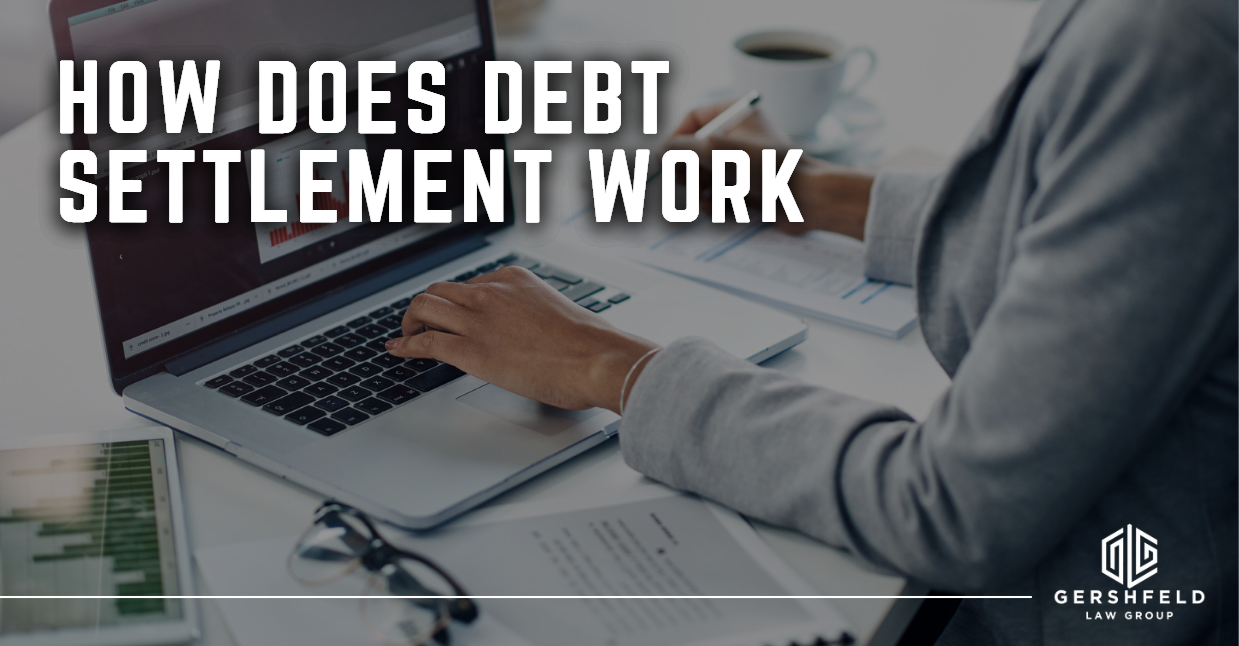The majority of debt problems are caused by different financial adversities including divorce, medical difficulties, or salary loss.
These are real difficulties that anybody can encounter without warning and which, through no fault of their own, can cause severe financial stress. Debt may become intolerable, especially if unforeseen costs make it difficult to make payments. In case you’re facing difficulties making your payments, you may consider the alternative of debt settlement.
At Gershfeld Law Group, we specialize in debt relief through the use of realistic and ethically sound debt settlement strategies. But how does debt settlement work? Let’s analyze it.
How Does Debt Settlement Work
Debt settlement is settling your debt by negotiating a lower principal amount with your creditors. Debt settlement attempts to reduce the overall amount of debt, as opposed to debt consolidation, which lumps several obligations into a single loan with a lower interest rate. This procedure can offer substantial relief, particularly if you’re finding it difficult to move forward with your payments due to excessive interest rates.
The Debt Settlement Process
- Initial Consultation
The first step is an initial consultation with our well-trained Debt Analysts at Gershfeld Law Group. During this consultation, we’ll review your financial situation, including the amount of debt you owe, your income, and your expenses. This helps us determine if debt settlement is the right option for you.
- Financial Assessment
To qualify for debt settlement, certain criteria typically need to be met. Generally, you should have more than $10,000 in unsecured debt, be unable to afford more than the minimum monthly payments, and be experiencing financial hardships such as divorce, unemployment, or medical bills. If you meet these qualifications, you may be a good candidate for debt settlement.
- Creating a Debt Settlement Plan
Once we determine that debt settlement is suitable for you, we’ll develop a customized plan. This plan will outline the debts to be settled and the proposed amounts for settlement. We’ll also set up a dedicated savings account where you’ll make regular deposits to accumulate funds for settling your debts.
- Negotiating with Creditors
Our experienced negotiators will contact your creditors to propose settlements. The goal is to convince them to accept a reduced payment as a full settlement of your debt. Creditors are often willing to negotiate because they prefer receiving a partial payment over the risk of getting nothing if you declare bankruptcy.
- Settling Debts
Once a creditor agrees to a settlement, we’ll use the funds in your dedicated account to pay the agreed-upon amount. This process is repeated with each creditor until all your debts included in the settlement plan are resolved.
Advantages of Debt Settlement
Now that you know the answer to the question: how does debt settlement work? It’s a good idea to go over some of the advantages of choosing this debt relief option.
- Get Relief from Overwhelming Debt and Pay It Off Faster
Debt settlement can help you reduce the amount you owe and settle your debt faster than other methods like debt management plans or credit counseling programs. While those methods can take longer, a legitimate debt settlement program might help you pay off your debt in two to four years, compared to the longer timelines for debt consolidation or bankruptcy.
- Avoid Bankruptcy
Many consumers considering debt settlement are weighing it against bankruptcy. Traditional repayment methods haven’t worked for them. Although debt settlement impacts your credit, it’s not as severe as filing for Chapter 7 or Chapter 13 bankruptcy. Creditors prefer settlement because they receive some payment instead of potentially nothing with bankruptcy.
- Prevent Debt Collection and Charge-Offs
Debt settlement can help you avoid having your debt sent to collections or charged off, which means sold to a collection agency. While it won’t solve all your financial problems, reaching a settlement stops calls from debt collectors. Reducing your debt and avoiding bankruptcy are clear benefits, and stopping harassing calls can be a significant relief for many.
- Avoid Lawsuits for Your Debt
Facing a lawsuit over debt is a worst-case scenario for many. Debt settlement might help you avoid being sued for credit card debt and the lengthy legal process that follows. While secured debts like mortgages and car loans can’t be settled (leading to foreclosure or repossession), unsecured debts such as credit cards can be. Creditors might settle to avoid the expense of a lawsuit, though they aren’t obligated to accept a settlement offer, and the terms might not always be affordable for you.
Debt settlement offers a way to manage overwhelming debt, avoid bankruptcy, and prevent collections and lawsuits. However, it’s important to be aware of the risks and work with reputable professionals, like those at Gershfeld Law Group, to navigate this complex process. Our team at Gershfeld Law Group is here to help you navigate this process with honesty and integrity.










